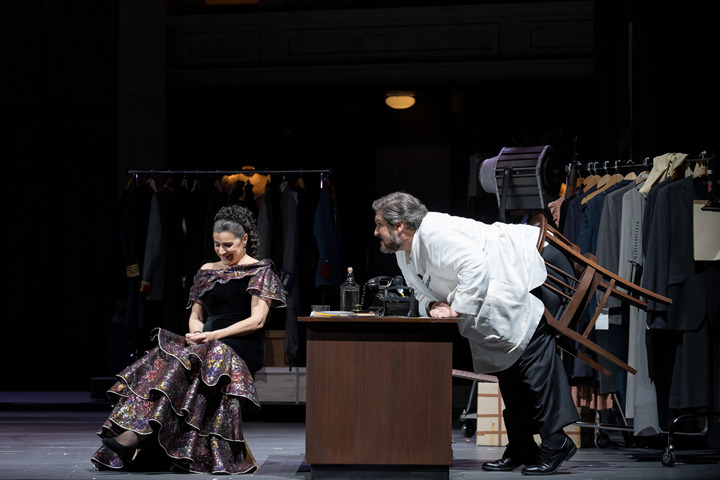| Opera Reviews | 20 May 2024 |
Good fun all roundby Moore Parker |
|
Rossini: Il barbiere di Siviglia |
|
 |
|
|
Salzburg’s Whitsun Festival - under the artistic direction of Cecilia Bartoli - produces an opera highlight traditionally also included in the Summer Festival’s repertoire, thereby providing a longer series and opportunity for increased exposure. And judging by the perennial triumphs it appears that Ms. Bartoli possesses something of a Midas touch. Rossini’s Il barbiere di Siviglia is this year’s bill in a production by Rolando Villazón with Bartoli undertaking Rosina - the role which (in her home city Rome, in 1987) became the springboard for the extraordinary international career to follow. Villazón’s ebullient personality (familiar from many of his tenor roles) underscores his interpretation of Rossini’s masterpiece and is unsurprisingly quirky in its effervescence and originality. He marries the familiar Beamarchais play to the “Silent Movie” world of a century past, while introducing a new character to the plot - a foil who serves as a backboard throughout, played by Arturo Brachetti, a pantomimist who holds the Guinness Book of Records listing as the quickest and most prolific “Change Artist” in the World. Villazón’s imagination and creativity are no less than dazzling and here the entire creative team - Harald Thor (Sets), rocafilm, Ramses Sigl (Choreographer), Stefan Bolliger (Lighting), Christian Arseni (Dramaturgy) and Brigitte Bolliger (Costumes) have achieved a credible amalgam of theatrical tools which augment the subject matter while maintaining due respect to the composer and the performers. During the overture an elderly studio employee establishes the concept with reels of footage of his beloved star - a great film diva (alias Rosina) dashing between a selection of parts as diverse as a Nun, Cleopatra, Joan of Arc and a swashbuckling Pirate - until the title “Once Upon a Time in Seville” appears - and with it the cast steps out of their film ambience to present the evening’s opera. And the interchange between both worlds continues as an extra dimension and ingenious way of assimilating entries and exits through clever door flaps and lighting techniques. Rosina’s abode is an enormous silver bird cage fitted with a swing, and elasticated bars for unsolicited entry and exit. The construction rolls as desired and was at times amusingly propelled between the characters with remarkable dexterity. Its silver colour naturally coordinates with the Deco fashion of the period - thereafter fully expanded indoors for Rosina’s singing lesson (in which a billiard table and bar also bring variety to the action). Musical themes from familiar films are woven into moments of recitative, while even Laurel and Hardy skits and Frankenstein enjoy unexpected appearances. Slapstick and gags abound throughout. The production is a product of enormous thought, detail and rehearsal, with every player strikingly portrayed and credible. Ultimately, though, if any fault were to be levied it is simply that there is too much of a good thing. Too many dead chickens flying and too few moments of repose. But as the celebrated cellist William Pleeth once said of his then teenage student, Jacqueline du Pré, “you have to begin with an excess, otherwise you have nothing to refine.” The entire line-up of artists is lofty with each individual easily ranking alongside any within living memory - and possibly beyond. Rosina’s Beau, Il Conte d’Almaviva was taken by Uruguayan tenor Edgardo Rocha. He brings a rare combination of consummate bel canto technique and style, good looks with a slender manly stature, and a winning natural acting talent. Nicola Alaimo needs no introduction as one of the exceptional Italian baritones of our day. His larger-than-life Figaro projected across the footlights with sheer equanimity, and the famous “Largo al factotum” landed an anticipated hit with the house. The inimitable veteran, Alessandro Corbelli is so endearing that one can’t but help warming to this Bartolo despite his stringent handling of Rosina. A master of understatement in play, and a singer whose bubbling pitter-patter can surprisingly blossom into bombastic vocal moments to easily ride with the more junior members in the cast. Arguably at his zenith, Ildebrando D’Arcangelo revels here in his opportunities as Basilio - cloaked with his creepy elongated fingers and spiky ears to resemble Murnau’s 1922 film creation, Nosferatu. D’Arcangelo’s voice has matured remarkably - quite majestic in all ranges, and undeniably beautiful in timbre. Rebeca Olvera’s Berta scores with aplomb in her Act 2 scene - produced here as a period Song and Dance number in black tails, top hat, and cane, while José Coca Loza is convincingly type-cast as the gambling Mexican Bandito, alias Fiorello. Strong cameos in addition by Max Sahliger (Ambrogio) and Manfred Schwaiger (Domenico la Forza). Cecilia Bartoli’s Rosina almost negates the passing decades - irrepressible, alluring, comfortably adept with Rosina’s castanets, in addition - and a delight in her exuberant joy. For the record, she interpolated a ringing top D natural as a surprising jewel to crown the encored Act 2 Finale. Gianluca Capuano led a sparkling evening totalling some three and a half hours, with the ensemble Les Musiciens du Prince - Monaco playing period instruments and well-complimenting the top-notch cast in a taut and colourful reading.
|
|







